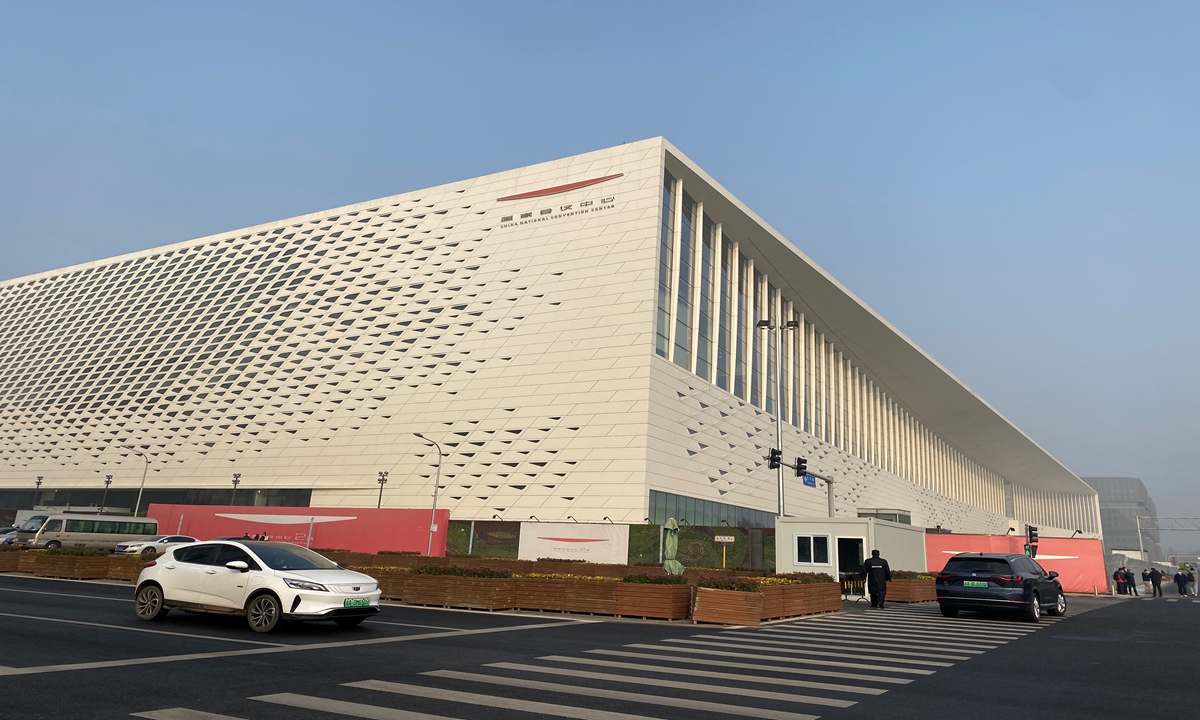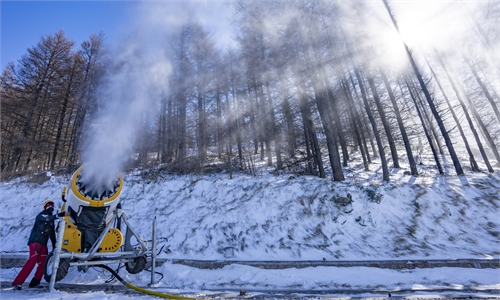Smart techs to shield foreign reporters against COVID-19 during Beijing Winter Olympics

The China National Convention Center in Beijing will serve as the main media center to hold about 15,000 journalists from more than 100 countries in the upcoming Beijing Winter Olympics. Photo: Fan Anqi/ GT
Disinfection robots, delivery robots, unmanned canteens, cloud monitoring platform … The China National Convention Center in Beijing, which will serve as the main media center to hold about 15,000 journalists from more than 100 countries in the upcoming Beijing Winter Olympics, has come up with new anti-epidemic ways that are more efficient, convenient and green, the Global Times learned on Thursday.
With construction for the venue completed in June, nearly 300 reporters with the Olympic Broadcasting Services (OBS) from the US, UK, Japan, Australia, Russia and other countries had arrived at the center on July 4, setting up their broadcasting equipment.
They are now living in a designated hotel with dedicated buses picking them up to or from the center, Zhang Lidong, chief engineer of the venue, told the Global Times.
During the Games, there will be more than 3,000 journalists and 12,000 broadcasters from over 100 countries working in this area, staff at the center said.
To ensure the safety of media workers and prevent cross-infection or cluster infection, the center has deployed robots on various missions - guidance, food and package delivery, disinfection, sanitation, and others.
They will be designated to all corners of the center and provide work and life services 24/7. For example, the disinfection robots will repeatedly spray disinfectant along its movement tracks nonstop.
There are more than 100 robots to be deployed, staff at the center said.
All venues will be under protection of the high-tech aerosol virus testing system which automatically detects and tests the environment of every venue and will send alarm if it finds traces of the virus, according to the Beijing Winter Olympics Organizing Committee.
The system is three times more accurate than previous technologies.
A robotic dining hall will also be put into use for media workers, where there will be only robot cooks preparing all the meals - not only cutting off possible virus transmission risks, but it's also cost efficient.
The entire movement trails of people will be tracked by a central control platform that manages all the cameras and access to the venues. As different sections for closed-cycle management will be set up during the Games' broadcasting, access controls will give authorizations to certain places for each personnel, to make sure they can only swipe in to the areas they are allowed to.
In addition, an anti-epidemic checking and monitoring system can help ensure the stable functioning of the venues. For example, once a person develops a fever or other COVID-19 symptoms, the system can track the person's close contacts and where they have been, allowing for more accurate and convenient location and epidemic screening tests.
Upon the arrival of foreign reporters, they will be placed in individual rooms at designated hotels, and receive nucleic acid tests every day. Different colors of vests will be given to distinguish the different batches of guests according to their arrival date.
The venue will also set up sections separating areas under closed-cycle management, and people in each section are not allowed to cross work.
On Wednesday, the Beijing Winter Olympic Organizing Committee received a report that another foreign athlete who was participating in sledding testing events in Beijing has tested positive in a routine COVID-19 test.
This is the third case of COVID-19 carriers found among the more than 1,000 Winter Olympics-related foreign athletes in China. The athlete is a silent carrier and a close contact of the previous two silent carriers, said the Organizing Committee.
With the severe situation of the pandemic, the vast majority of Olympic audience around the world will rely on broadcasts from the media center, which is regarded as the "brain" of all event output. It is expected that more than 4 billion people will watch the Games through TV and online channels, the Global Times has learned.

